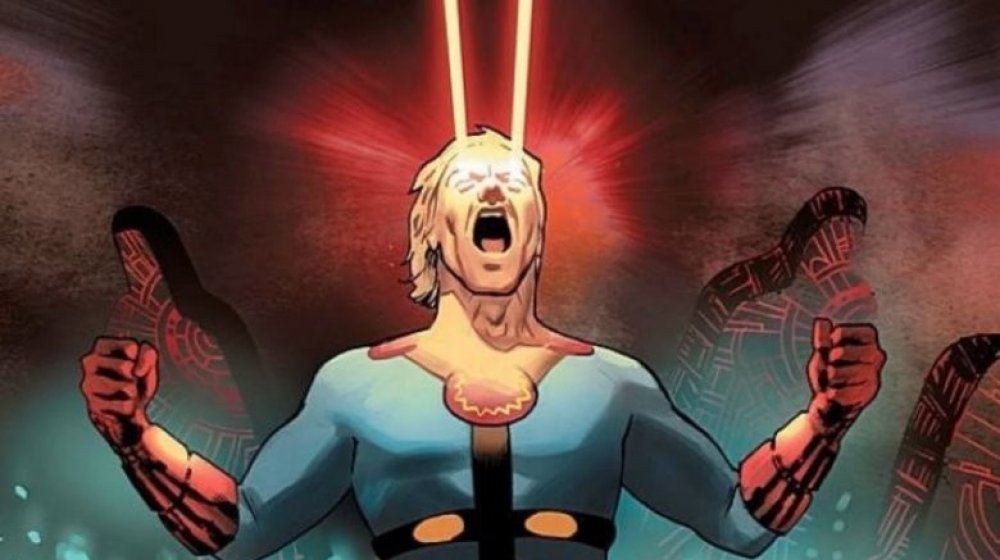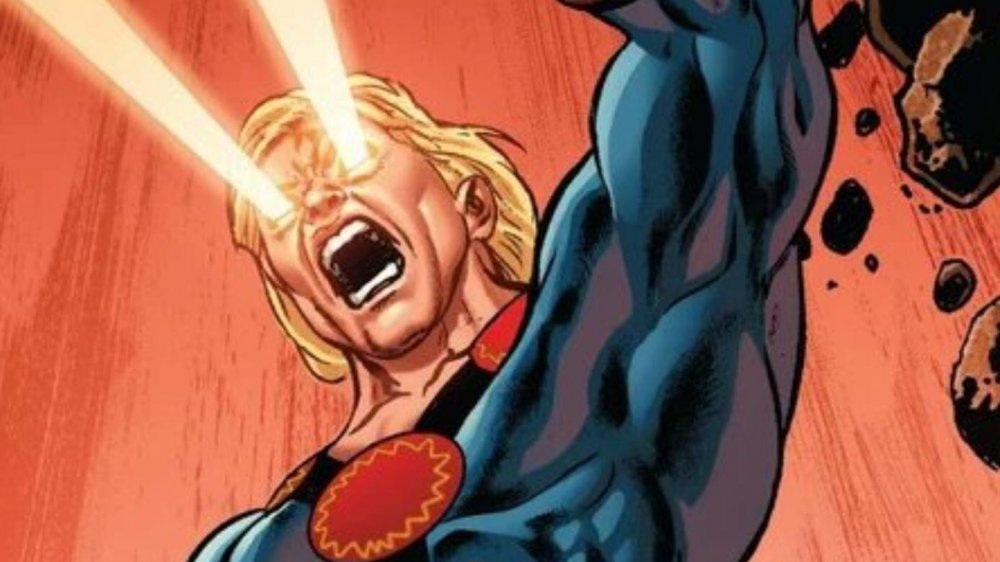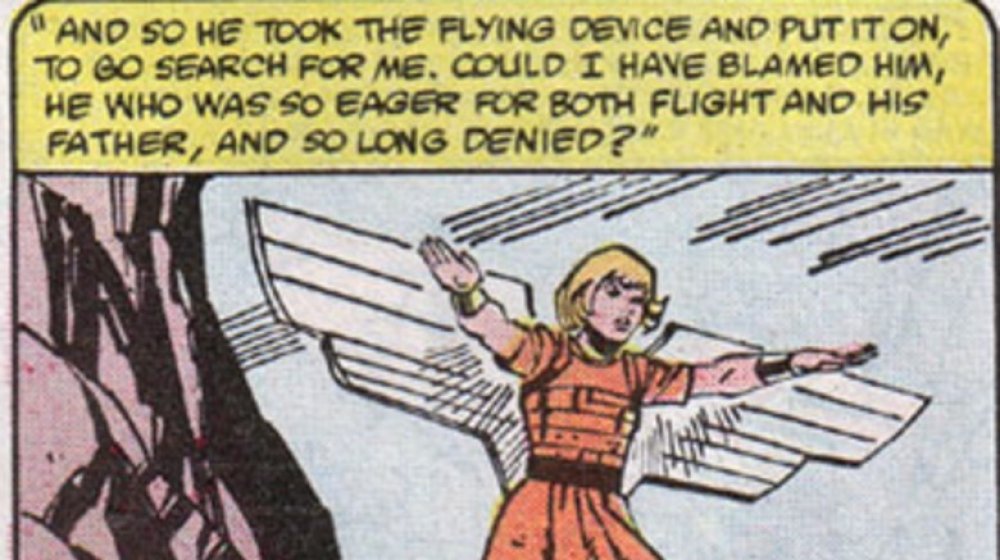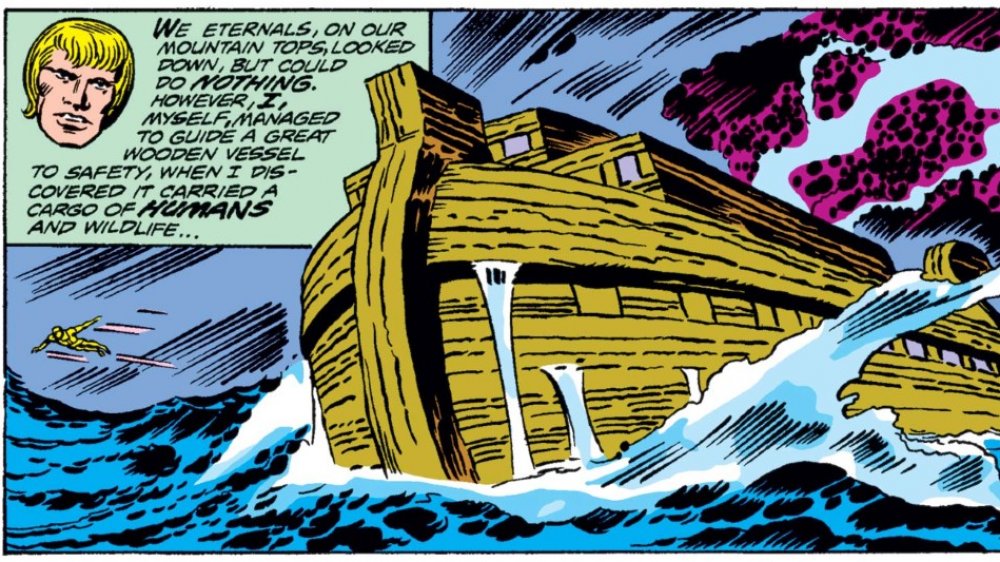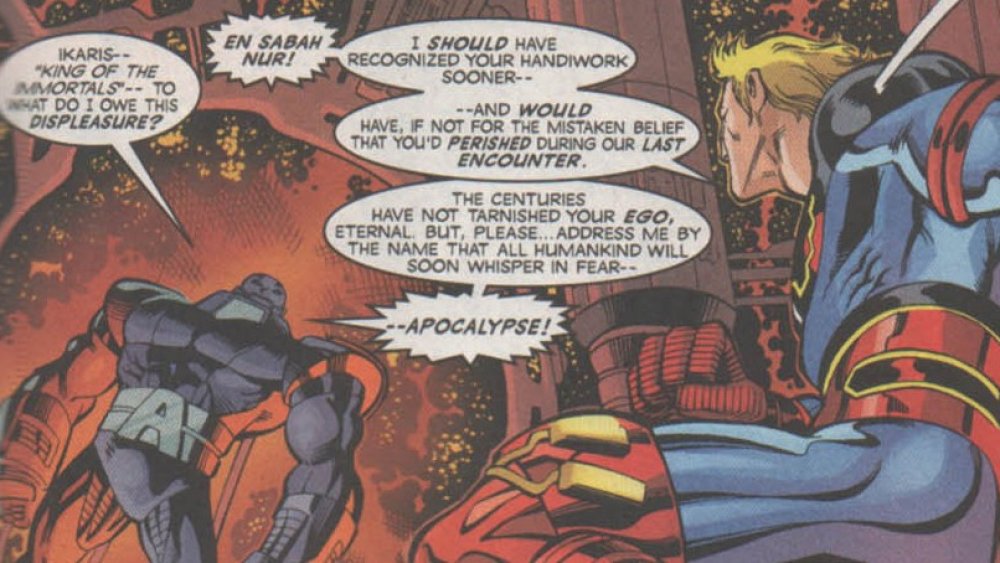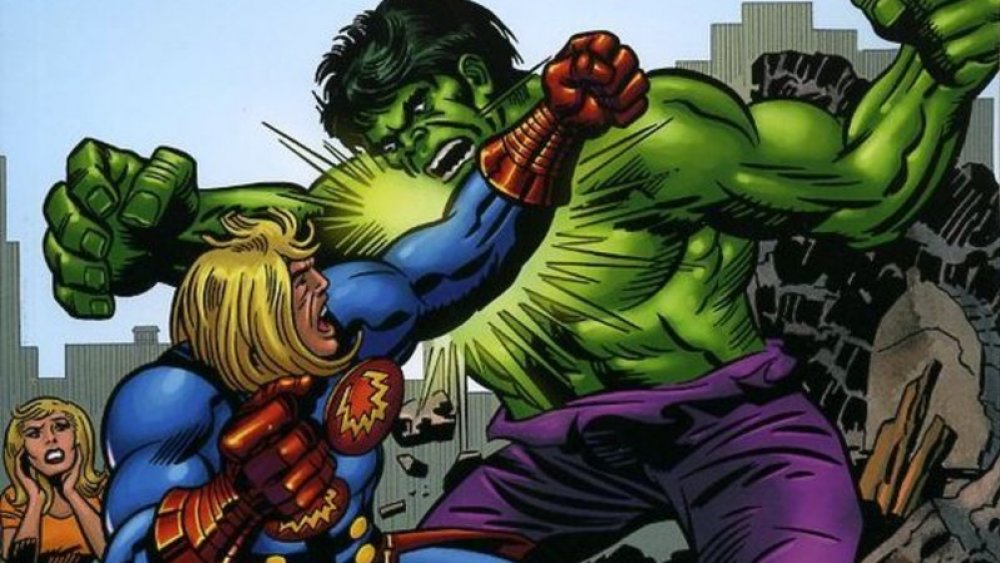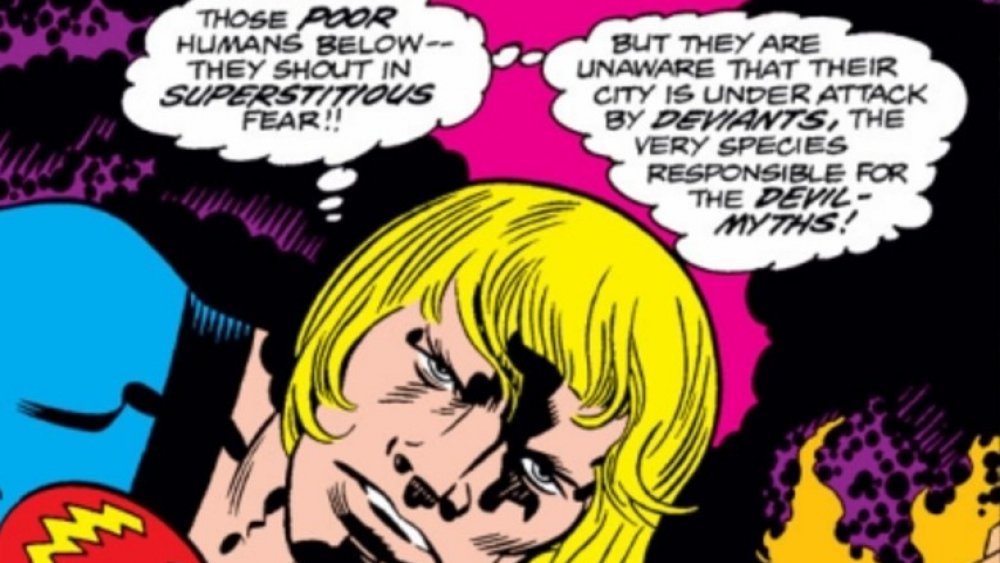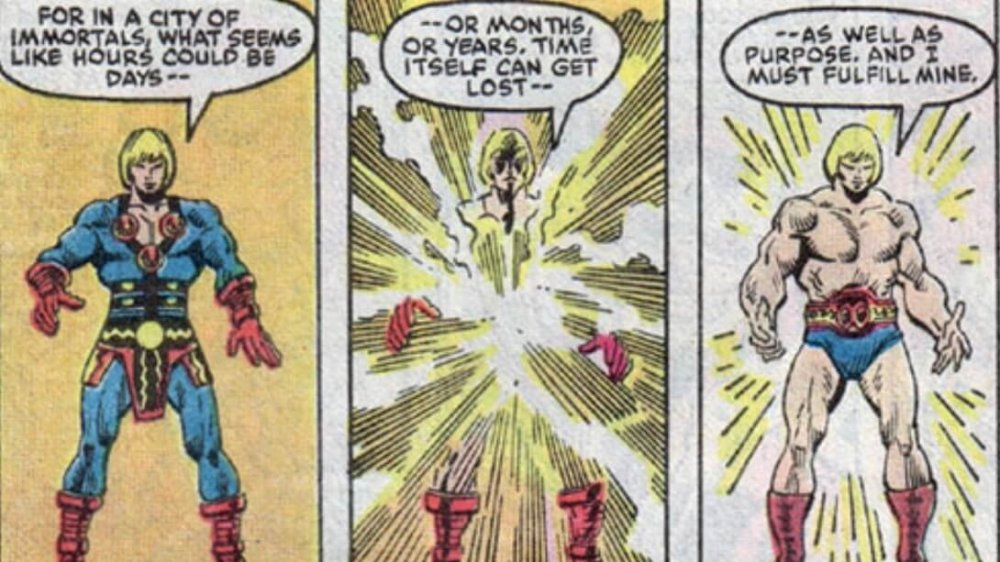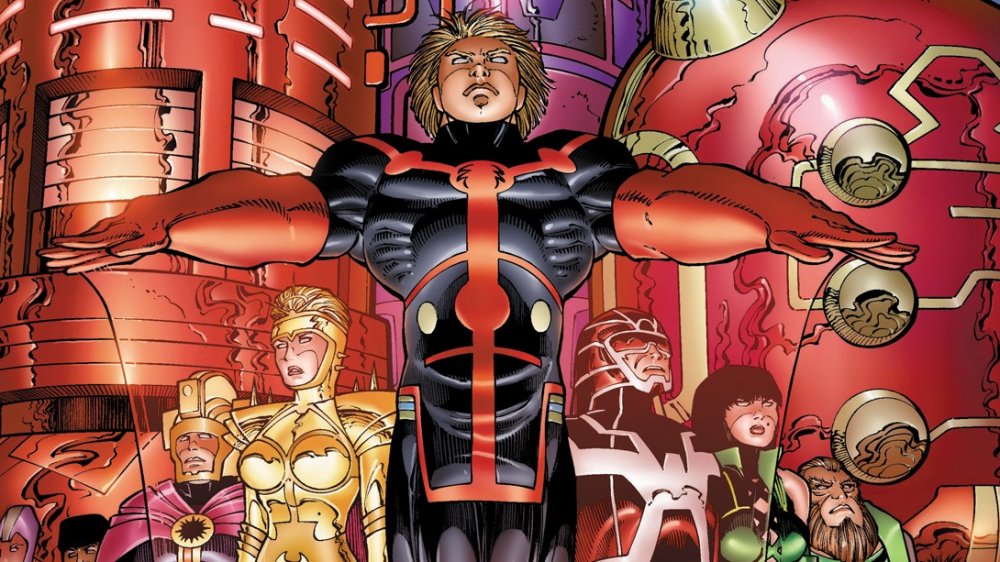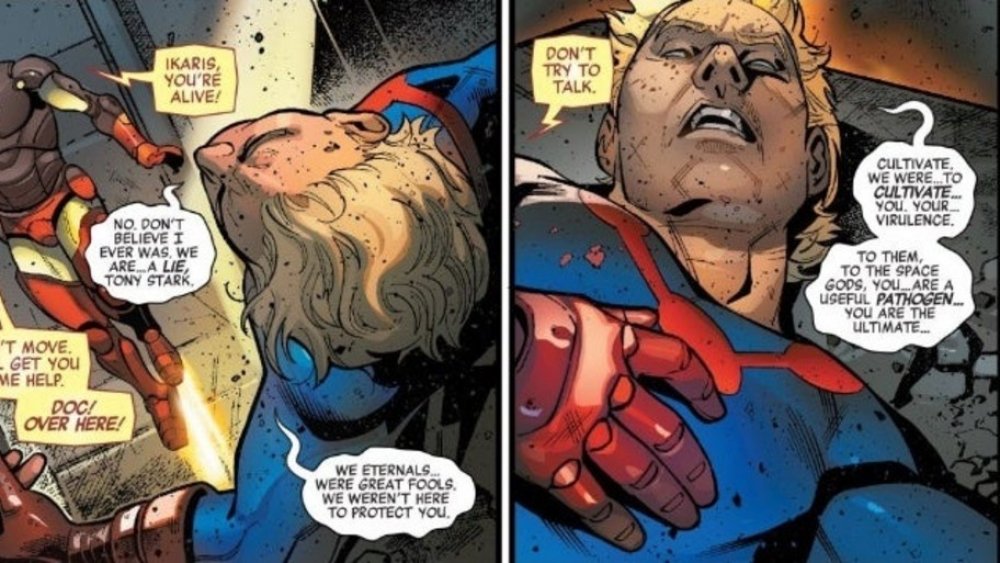Everything You Need To Know About Marvel's Ikaris
Marvel Comics isn't short on gods. While any fan of the Marvel Cinematic Universe is familiar with Norse deities like Thor and Loki, in the source material, the citizens of Asgard are just the beginning of the comics' many pantheons. Marvel heroes have fought both with and against gods culled from Greco-Roman myth like Zeus and Ares, Hercules often counts himself among the Avengers' ranks, and beings from the pantheons of ancient Egypt, the Celts, and more appear as both villains and heroes in Marvel's stories.
Inspired by ancient myth and legend, artist Jack Kirby created his own Marvel pantheon in the form of the Eternals, and their most prominent hero is Ikaris. Identifying as Earth's protectors against their biological counters, the Deviants, the Eternals have been around long before Captain America started giving Axis tyrants socks to the jaw. Ikaris' heroics predate even the written word, and both Kirby and other comic creators make it clear the Eternal hero has helped shape the history of Marvel's Earth, and the long life that's made this possible also has given him the chance to lock horns with equally immortal villains who wouldn't get the chance to harass Marvel's younger heroes for millennia.
For more specifics, keep reading for everything you need to know about Ikaris.
The Prime Eternal
Ikaris isn't just any other Eternal. He's the so-called Prime Eternal. However, this wasn't always the case, and to know why this is important, a brief history of the Eternals themselves is necessary.
After the god-like Kronos' fateful experiments with cosmic energy destroys his physical body while keeping his mind intact, his two sons, Zuras and A'lars, fight a conflict over the future of the Eternals. After Zuras wins, A'lars leaves for Jupiter's moon Titan where he will later become father to Thanos. When the remaining Eternals form the Uni-Mind — a powerful, conglomerate being comprised of the collective Eternal consciousness — it chooses Zuras as the Prime Eternal. When Zuras is killed during battle with the Celestials in 1980's Thor #300, Thena is selected as the new Prime Eternal. In 1986's Eternals #9, after Ikaris accuses Thena of treason because of her loyalty to her Deviant lover, Kro, Thena passes on the role of Prime Eternal to Ikaris. While Zuras would eventually return from the dead, Ikaris retains the position.
Being the Prime Eternal means more than just a fancy title. Among other things, whoever is named Prime Eternal is given the privilege of initiating the formation of the Uni-Mind — an act that has saved both the Eternals and Earth on more than one occasion.
Ikaris and the story of Icarus
If you're familiar with ancient myth, then you've probably already guessed the name Ikaris is inspired by the story of Icarus, the boy who flew too high. What you may not know is that in a mid-'80s miniseries, the connection between Ikaris and Icarus was made much more literal.
In Greco-Roman myth, Icarus is the son of Daedalus, a genius forced to serve King Minos. It's Daedalus who designs the labyrinth meant to act as prison to the man-bull monster, the Minotaur. When King Minos imprisons Daedalus and his family so that the secret of the labyrinth can never be revealed, Daedalus constructs flying machines out of bird feathers and wax. Upon their escape, Daedalus warns his son not to fly too close to the sun, but Icarus ignores him, and when the wax of Icarus' flying contraption melts, he plummets to his death into the sea.
In 1986's Eternals #5, we learn that in the Marvel Universe, it's the Eternal Ikaris who's the inspiration for this story. Centuries before he would fight alongside modern heroes like the Avengers, Ikaris had a son named Icarus. One day, believing his father to be imprisoned by Deviants, Icarus attempted to use a mechanical flying device to find his father. Like the Icarus of myth, the boy flew too high and eventually fell to his death. After learning of his son's fate, the Eternal named himself Ikaris to honor his fallen child.
He was Noah's Guide
In an early Ikaris appearance, we learn it isn't just Greco-Roman myth that the hero helped inform. In 1976's Eternals #2, it's revealed that Ikaris makes an appearance in the early chapters of the Bible.
Recounting his story to his future love, Margo Damian, and her archaeologist father, Ikaris tells of the same destructive flood that covers the Earth in the Biblical book of Genesis. Ikaris regrets that neither he nor his brethren could do anything to stop or slow the flood, though he does find a way to help. When he spots a "great wooden vessel" in the midst of the apocalyptic flood, he flies nearby and guides it to safety. The implication, of course, is that the ship Ikaris describes is Noah's Ark carrying its precious few humans and its many beasts. Ikaris, in turn, is the dove the Bible describes that guides the Ark to land.
Ikaris was an early enemy of Apocalypse
One of the X-Men's most popular villains is Apocalypse, who first shows up using that name in 1986's X-Factor #5. But while readers wouldn't learn of him until the mid-'80s, it's since been revealed that he's enjoyed a much longer life and faced a number of heroes before he met any of the X-Men. For example, we learn he fought a younger Thor in 2013's Uncanny Avengers #6, and we also know that at one point, he faced off against Ikaris and the Eternals.
In the 2000 one-shot New Eternals: Apocalypse Now #1, the mutant unleashes one of his many villainous plots. Ikaris and Apocalypse don't meet face-to-face until toward the end of the issue, and when they do, the meeting comes with the revelation that they're old enemies. While their dialogue doesn't reveal too many details, we do learn some interesting things. Ikaris refers to the villain as "En Sabah Nur," suggesting their last encounter was centuries earlier when Apocalypse was better known by that name. Ikaris also says he'd believed Apocalypse had died in their last meeting. At first, that might not seem like much of a reveal — after all, as a popular Marvel Comics villain, Apocalypse is legally required to die and be resurrected every few years — but the fact that Ikaris and his brethren so thoroughly defeated Apocalypse as to believe him dead proves just how formidable these immortal heroes can be.
Ikaris is one of the most powerful Eternals
Ikaris is well-chosen as the Prime Eternal, as even before he's given that title, he proves himself one of the most powerful of his brethren.
Ikaris boasts a wide array of abilities, including impressive super strength and durability. He expertly wields cosmic energy that's often seen blasting from his eyes. And he can manipulate this ability in various ways, using it to create deadly heat, often referred to as his disintegration beams. The powers serve him well in battle. In 1977's Eternals #14-#15, Ikaris goes toe-to-toe with a cosmic-powered robot designed to look, act, and display powers similar to the Incredible Hulk. While not the real deal, the cosmic-powered Hulk robot is no pushover, and it would go on to give plenty of trouble to Marvel powerhouses like the Red Hulk and the Fantastic Four's Thing. Ikaris has also faced powerful challengers like the mutant Apocalypse, as well as Olympian gods like the war deity Ares.
Similar to the other Eternals, Ikaris can fly. And while they aren't his most used abilities, he's also been shown to have the ability to teleport, and he even has some low-level psychic talents.
Ikaris is humanity's defender among the Eternals
It's perhaps understandable that, since the Eternals tend to living separate from humanity, some of the Eternals aren't thrilled to share the Earth with humans, and some of these guys aren't quite so dedicated to their safekeeping. Ikaris, however, has always done everything he can to defend humanity.
Ever since the ancient times, Ikaris has been going above and beyond to protect the people of Earth. From his guidance of Noah's Ark to safety and battling Apocalypse before the X-Men existed to aiding the Avengers in their quests to keep the Earth safe, Ikaris has always advocated for the humans in spite of being advanced beyond them in many ways. It's why when most of the Eternals leave Earth after the battle with the Inhuman villain Maelstrom in 1984's Avengers #246-#248, Ikaris is one of the few selected by the Uni-Mind to stay behind and continue to use his power to protect those who can't protect themselves.
Ikaris had a surprising career
The idea of a superhero taking on a relatively mundane job is nothing new. Spider-Man has been a photographer, Daredevil has been a lawyer and even a parole officer, and the godlike Superman has spent countless hours pushing his glasses up the bridge of his nose and writing stories for the Daily Planet as Clark Kent. Regardless, it's still a bit of a shock to read the 1985-86 Eternals miniseries and learn the noble and powerful Ikaris is working as a professional wrestler.
In 1985's Eternals #1, we learn that Ikaris has joined the ranks of Marvel's Unlimited Class Wrestling Federation (UCWF) as Ike "The Iceberg" Harris. We get to see him in action in his wrestling digs, and judging by the applauds and cheers, this is hardly Iceberg's first time in the ring. Of course, it's eventually revealed Ikaris didn't join the UCWF because he enjoys the applause or hitting people with folding chairs. Ikaris has been climbing the UCWF's ranks for the chance to take on the wrestler Enigmo, who's actually Cataphrax the Mighty, a Deviant villain in disguise.
The UCWF was one of the more prominent Marvel fictional organizations in the 1980s. Along with Ikaris, heroes like Justice, D-Man, and Ms. Marvel — not Kamala Khan but a hero who would later become known as She-Thing — are some of the heroes who wrestled in the UCWF, though the most prominent is Ben Grimm, aka the Thing
Ikaris helped reawaken the other Eternals
Ikaris and the other Eternals claim the distinction of being one of the few franchises Neil Gaiman has written for Marvel Comics. Comic book-wise, Gaiman is best known for his groundbreaking DC/Vertigo Sandman series, though he's written a few projects for Marvel. In 2003-04, he wrote 1602, which introduced early 17th-century European versions of most of Marvel's most popular heroes. And after Marvel acquired the rights to Miracleman, Gaiman wrote subsequent issues of the long-dormant story. And in 2006-07, with John Romita Jr. drawing, he injected fresh blood into another long-sleeping property — the Eternals.
The mid-aughts Eternals miniseries begins with all of the godlike beings stripped of their memories and living as ordinary humans. The speedster Makkari, for example, is living as Mark Curry, a med student. Sersi is a party organizer, Thena is a scientist working for Stark Industries, and Zuras is an alcoholic homeless man. We eventually learn that their memories have been stripped by the mischievous Sprite, but before we know the culprit, it's Ikaris who sets out to find the Eternals in order to reawaken their old memories.
The fall of Ikaris
The last we heard from Marvel's Eternals in the comics, they'd fallen to a horrible fate, and Ikaris was the last to survive. When Avengers relaunched in 2018, it was with a storyline involving Dark Celestials, a group of evil cosmic beings. When the corpses of the powerful Celestials fall to Earth, it sets the Avengers on a quest that ultimately reveals a dark secret about the Celestials, the Eternals, and humanity.
When Iron Man travels to the Eternals' home of Olympus, hoping to get information, he finds a slaughterhouse. The only living Eternal he finds is Ikaris, and the Prime Eternal doesn't live long. Ikaris stays alive just long enough to reveal that his people erupted in an opera of madness when they learned their true purpose — that the Dark Celestials meant for humanity to act as a virus against an army of insect-like monsters called the Horde, and the Eternals were meant to cultivate that virus and get humanity ready for the eventually harvesting. Before he succumbs to his wounds, Ikaris gives Iron Man access to the Uni-Mind, which the Avengers are later able to use to defeat the Dark Celestials.
In spite of Ikaris' and the Eternals' brutal end, it's probably far too soon to count them out of the Marvel Universe. Considering the rate at which comic book heroes and villains die and are reborn, the return of Ikaris and his people seems likely, if not inevitable.
